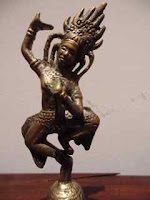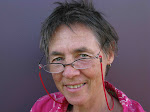 |
| Bronze apsara Photo: © Susan Hawthorne, 2013 |
In May 2013, Spinifex published Judy Foster's Invisible Women of Prehistory. The thing about a book like that is that it makes you see the world differently. I have been visiting archaeological sites since 1976, looking at marks in stones, checking the positioning of sites important to women, reading the mythologies behind them and generally keeping my eyes and my mind open.
In late May I visited Cambodia to see Angkor Wat. I had heard about the size of Angkor Wat, I'd heard that there were numerous temples to visit, I heard there were inscriptions. What I hadn't heard about was the huge number of female bas reliefs carved on the walls of temples. I'm not here talking about dozens of female carvings, or even hundreds. There are thousands of them here. Why is this not mentioned in the guide books?
 |
| Apsara, Bantei Srei Photo: © Susan Hawthorne, 2013 |
 |
| Apsara, Bantei Srei Photo: © Susan Hawthorne, 2013 |
The standard guide books include a few mentions and a few images, but one day I just stood in the blazing sun, overwhelmed by the apsaras in front of me. Most of the figurines are either apsaras or devatas. Apsaras are dancing figures, their legs bent, their arms spread, their hands in a range of positions full of meaning for those who know the secrets of the sacred dances. In English apsaras are sometimes referred to as angels, but my suspicion is that apsaras play a much more important function in the religious pantheon on display in these temples.
 |
| Three devatas, Angkor Wat Photo: © Susan Hawthorne, 2013 |
 |
| Fifteen devatas in a corner, Angkor Wat Photo: © Susan Hawthorne, 2013 |
 |
| Devata, Bantei Srei Photo: © Susan Hawthorne, 2013 |
The word devata means simply a female divinity or goddess. Devatas are divine figures, goddesses. The Cambodian religious world is filled with the names of the Hindu gods and goddesses but only a few of the devatas are given names. There is
Lakshmi, Durga, Sita, Parvati. And I saw just one reference to Sarasvati, the Hindu goddess of writing and knowledge.
 |
| Leaves, Sambhor Prei Kuk Photo: © Susan Hawthorne, 2013 |
By contrast, the male gods are named on
almost every occasion. The lingam (a phallus, as every guide will tell you) is
pointed to and discussed while the yoni (the vulva) is ignored in spite of
vulva images being carved into many places. The vulva is called a leaf, a
lotus, and while this is so, the lingam is referred to, visits are made to it,
guide books tell you how to visit these shrines.
In 2004,
Giti Thadani's book Moebius Trip was
published. In it she writes about the destruction of the archaeological sites
that are important to women. She writes about how they are destroyed through
neglect, how the breasts of statues are damaged and destroyed, how lingams are
inserted into places where the yoni had previously been important.Women are becoming a people without culture. Our historic and prehistoric cultures are under threat, not only from the ravages of war or the passage of time, but by ignorance. Some of this ignorance is caused by guides not being taught to see what is there right in front of them. In the Museum in Siem Reap, the final exhibition space is devoted to āpsaras. It is the only room in the museum to lack signage and a dead screen and no buttons to play videos explaining the history, the symbolism, the importance of these carved figures.
The
temple called Bantei Srei is a beautiful temple with extraordinary delicate
stone carvings. Bantei Srei is translated as 'the city of women'. In Sanskrit, srii denotes wise woman, someone who understands spiritual knowledge,
a sage or a sibyl, a woman of high status. At Bantei Srei there are plenty of
devatās, some even named, but what I
hear the guide say is that this is a mistranslation, what it really means is
that this is a temple to Shiva. So even when women get a guernsey, it is
denied.
The word 'apsara’ comes from ap from water plus srii. It occurs to me that perhaps the apsaras were created at the origins of the world, when the milk was churned (I explore this story in my poetry collection Cow) or are they perhaps the memory of the originating goddess, Aap who came before everything else. The fragmented body of Aap? As Mary Daly pointed out in Gyn/Ecology, the killing of the goddess, the dismemberment of her body is part of the process of dismembering the body of women, the memory of women, of fragmenting meaning and losing history. Feminists have been reclaiming this history over many decades and against many odds, including the impossibility of carrying out research and having that research published. Academic forums are not open to these ideas, indeed they have been suppressed. Perhaps now is the time to refresh our memories, to complain about misinformation and neglect.
The word 'apsara’ comes from ap from water plus srii. It occurs to me that perhaps the apsaras were created at the origins of the world, when the milk was churned (I explore this story in my poetry collection Cow) or are they perhaps the memory of the originating goddess, Aap who came before everything else. The fragmented body of Aap? As Mary Daly pointed out in Gyn/Ecology, the killing of the goddess, the dismemberment of her body is part of the process of dismembering the body of women, the memory of women, of fragmenting meaning and losing history. Feminists have been reclaiming this history over many decades and against many odds, including the impossibility of carrying out research and having that research published. Academic forums are not open to these ideas, indeed they have been suppressed. Perhaps now is the time to refresh our memories, to complain about misinformation and neglect.
While I was in Cambodia I found a book by Trudy Jacobsen
called Lost Goddesses. It becomes clear when reading this book that there has
been a massive shift in Cambodian history in how women are perceived and
treated. In the earliest periods for which there is historical evidence women’s
power is connected to land. It is they who have a say in how the social matrix
works. As power becomes centralised one sees for a while queens being recorded
and having significant power in the upper echelons of society. By around the
time of Angkor Wat, kings have begun to marry many women, thereby having access
to more land. By quid pro quo the families of the women gain some privileges.
By several centuries later, around 1400 CE, women have become commodities to
trade. Their power has all but vanished and is remembered only in this skeleton
way through trade in women. In a relatively short period in Cambodia one can
see the demise and diminution of women. That so many female figures are found
in the Cambodian temples does reflect their historical position. By now, they
are simply carvings and the central temples have been passed over to Buddhism.

